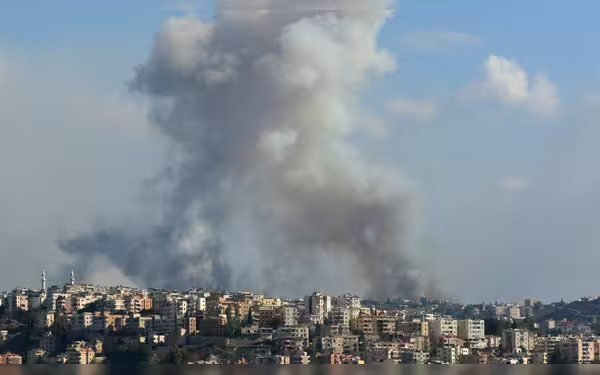Saturday, November 16, 2024 07:06 PM
Lebanon's Deadliest Day: Over 270 Killed in Israeli Strikes
- Israeli airstrikes kill over 270 in Lebanon.
- Hezbollah retaliates with rocket attacks on Israel.
- Mass evacuations as violence escalates in the region.
 Image Credits: arabnewspk
Image Credits: arabnewspkLebanon faces its deadliest day since 2006, with over 270 killed in Israeli airstrikes, prompting mass evacuations and escalating regional tensions.
In a tragic escalation of violence, Lebanon experienced its deadliest day of conflict since the 2006 Israel-Hezbollah war. On Monday, Israeli airstrikes resulted in the deaths of over 270 Lebanese individuals, marking a significant increase in hostilities in the region. This surge in violence has prompted widespread evacuations, with thousands of Lebanese fleeing southern areas as the Israeli military intensifies its air campaign against Hezbollah.
The situation has become dire, with the main highway out of Sidon, a southern port city, congested with cars as families seek safety in Beirut. The strikes have not only claimed lives but have also left more than 1,000 people injured, compounding the suffering in a nation already grappling with the aftermath of previous conflicts.
In response to the escalating violence, the Lebanese government has ordered the closure of schools and universities across most of the country, while also preparing shelters for those displaced from the south. The Israeli military reported targeting approximately 800 sites, claiming to focus on Hezbollah's weapon storage locations. However, many of these strikes have hit residential areas, raising concerns about civilian safety.
Hezbollah, in retaliation, has launched dozens of rockets into northern Israel, including attacks on military posts and defense facilities. This back-and-forth exchange of fire has heightened fears of an all-out war, especially as Israel continues to confront Hamas in Gaza. The situation is further complicated by Hezbollah's commitment to support the Palestinians, indicating a broader regional conflict.
As the violence escalates, the Israeli military has issued evacuation warnings to residents in southern and eastern Lebanon, urging them to leave areas where Hezbollah is believed to store weapons. These warnings have sparked a mass exodus, with communities on both sides of the border largely emptying out due to the ongoing hostilities.
Lebanon's Health Ministry has reported a staggering death toll of 274, urging hospitals to postpone non-urgent surgeries to prepare for the influx of casualties. The humanitarian impact of this conflict is profound, with families torn apart and communities devastated by the relentless airstrikes.
In the midst of this turmoil, it is crucial to recognize the human cost of such conflicts. The lives lost are not just numbers; they represent families, dreams, and futures shattered by violence. As the situation continues to unfold, the international community must pay attention and seek ways to foster dialogue and peace in a region that has seen too much suffering.













